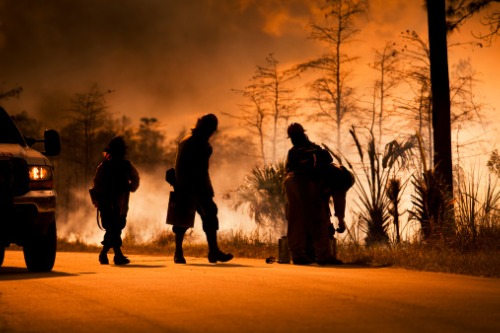
Australia’s bushfire emergency has seen at least 27 people die, more than 10 million hectares of land burned, 2,000 homes lost and around 1.25 billion animals killed.
Apart from being tasked with educating and protecting children, teachers working in fire-ravaged areas of Australia are also strong pillars of emotional support for those impacted by the disaster.
Teachers play a critical role in helping children deal with such issues as they look to adults as role models in times of need, according to Professor Marjory Ebbeck, an early childhood education expert from the University of South Australia (UniSA).
“Teachers are one of the most trusted, reliable and safe adult figures to a child, beyond their immediate family. But, with the school term just around the corner, many teachers are now feeling underprepared,” Professor Ebbeck said.
“Some families will have suffered major loss and trauma – lives, homes and communities have been destroyed – in these instances, children’s trauma reactions may be presenting in disrupted sleep, loss of appetite, withdrawal from activities, and even aggression.”
Further, educators can also provide stability and routine amid the changes going on in a child’s life due to the bushfires.
“Australia’s teachers must be commended for the work that they do now, and in times of stress. These days, our teachers are so much more than an educator – they’re educarers, and so often a haven for children in an increasingly unpredictable world,” Professor Ebbeck said.
How teachers can become edu-carers
UniSA childhood education experts recommend that aside from monitoring their students to work on individual support plans, they should maintain regular contact their students’ families to assess their situation and know how they and their child can be supported.
Teachers should also be on the lookout if their students are eating and drinking, as some traumatized children may “may not feel like eating, and they can become dehydrated if they do not drink enough fluids,” Professor Ebbeck said.
Addressing the emotional needs of students is also crucial, and can be done in a number of ways. Teachers have to understand, however, that it is normal for children to avoid talking about stressful topics.
“Show sensitivity to the needs of individual children. Help them understand that it is okay to feel frightened or angry. Follow the lead of the child and listen to them if they talk about their emotions,” Professor Ebbeck said.
“Give children opportunities to express their emotions through drawing, painting and other art forms such as modelling and collage work. Similarly, children may choose to play out their fears through dramatic play.”
Extra care should be also considered for younger children. For example, making use of makeshift cubby houses can help give the needed privacy should the need arise. Making use of books that touch on emotions can also help teachers reach out to younger students.
Last, but not the least, Professor Ebbeck recommended that teachers should encourage children to play “as this can help them create a sense of normalcy to release emotions and enjoy needed friendship.”
Another alternative
According to Australian National University (ANU) experts, children are also the worst affected when it comes to disaster-related trauma.
As a solution, the University came up with the Community Trauma Toolkit which, despite being targeted towards adults, can also help children as it provides guidelines on how to approach children after a bushfire as well as activities which can help their mental health.
ANU Australian Child and Adolescent Trauma, Loss and Grief Network director Nicola Palfrey points out that recovery period from trauma can be longer than expected. Palfrey also led the development of the Toolkit.
"For many children and adults the impacts of exposure to a traumatic event only begin to be evident in the months and years after it happened,” Palfrey said.
"Many people have the misconception PTSD is the only mental health condition that may develop after exposure to traumatic events like the bushfires. But many people also experience significant issues such as anxiety, depression and difficulties with relationships."


